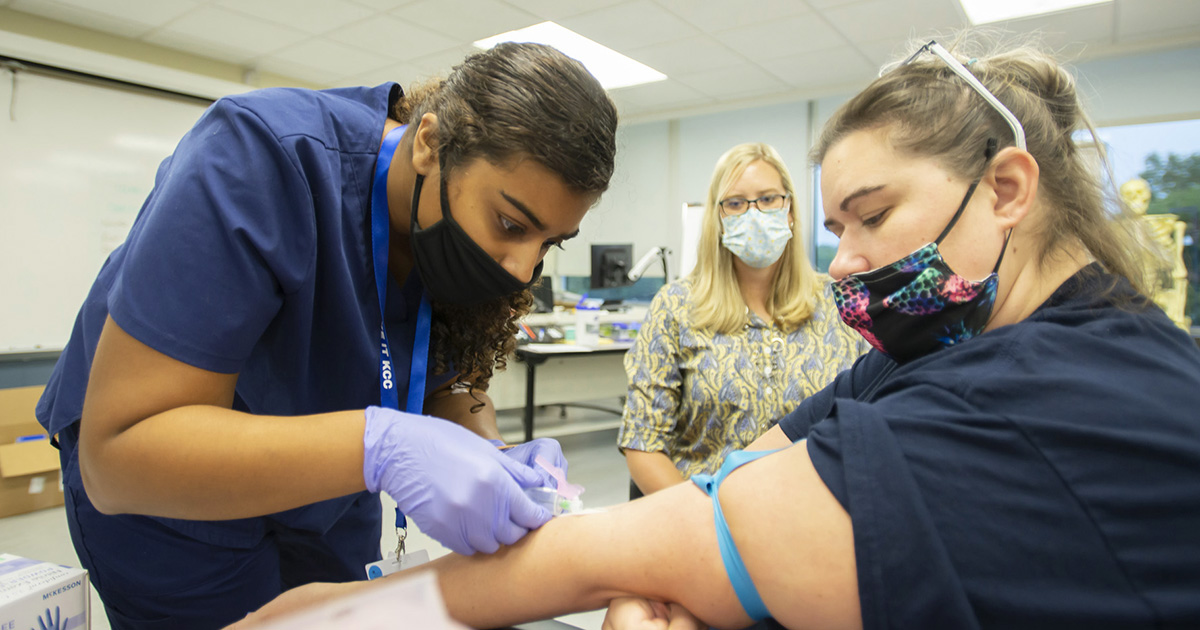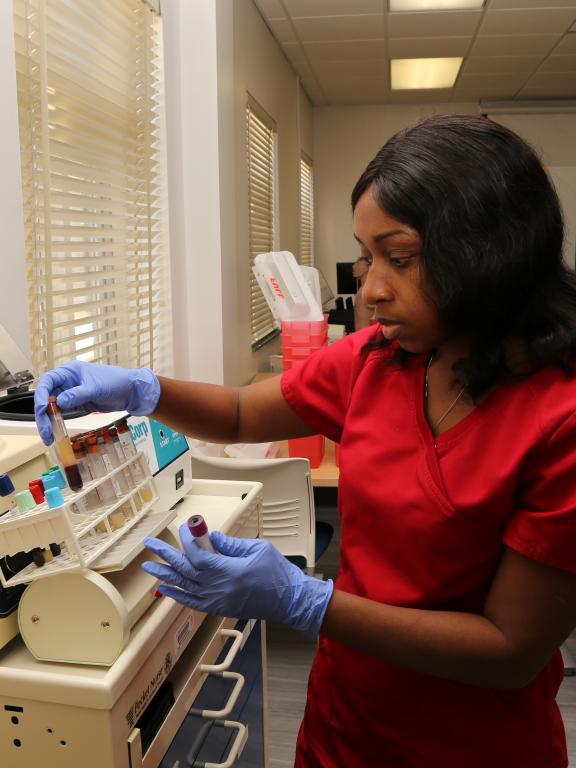Phlebotomy Classes Near Me: How to Find the Right One
Phlebotomy Classes Near Me: How to Find the Right One
Blog Article
The Path to Qualification: Understanding the Phlebotomy Educating Program Journey and Its Value
As you take into consideration the path to qualification in phlebotomy, it is necessary to understand the role you'll play in healthcare. Your training will cover vital abilities, from blood collection methods to patient communication. Each element of the program prepares you for the obstacles in advance. What specifically does the journey entail, and why is accreditation so important for your future profession? Let's explore these questions even more.

The Role of Phlebotomists in Health Care
Phlebotomists play a necessary duty in the healthcare system, functioning as the vital link between patients and necessary diagnostic screening. You'll do blood draws, ensuring examples are accumulated accurately and safely. Your competence assists in identifying clinical conditions, keeping an eye on wellness, and directing therapy decisions.
In your day-to-day communications, you'll require to develop trust fund with clients, making them really feel comfortable during what could be a stressful experience. You're accountable for labeling and taking care of samples carefully to avoid contamination or mistakes, which might impact examination results.
Past this, you'll commonly function along with physicians and registered nurses, communicating important information regarding clients' conditions. By grasping your skills, you contribute meaningfully to person care, making you an indispensable part of the clinical team.
Introduction of Phlebotomy Training Programs
When checking out phlebotomy training programs, you'll find various kinds made to fit various schedules and learning styles. Each program helps you establish essential skills like blood collection and patient communication. Recognizing these alternatives is essential to choosing the ideal course for your occupation.
Kinds Of Educating Programs
A number of kinds of training programs are readily available for those seeking to come to be skilled in phlebotomy. You can pick from certification programs, which commonly last a couple of months and concentrate on vital abilities. There are additionally diploma programs that supply a more extensive education and learning, commonly lasting approximately a year. If you're looking for a deeper understanding, an associate level in an associated area may be the appropriate fit. On the internet training courses provide flexibility for those stabilizing work or family members dedications, allowing you to research at your very own pace. In addition, some healthcare facilities and facilities provide on-the-job training programs, giving sensible experience while you find out. Whatever path you select, each program aims to furnish you with the essential skills for a successful phlebotomy profession.

Key Abilities Created
Grasping phlebotomy requires a collection of vital skills that are created via comprehensive training programs. In addition, interaction abilities are basic; you'll need to interact with patients, explain treatments, and placed them at ease. Each of these abilities is important for your success as a certified phlebotomist, making you a beneficial property in any healthcare setting.
Key Components of a Phlebotomy Training Course
In a phlebotomy course, you'll concentrate on vital topics that lay the groundwork for your future career. You'll involve in hands-on training that permits you to apply what you have actually found out in real-world settings. Both the core curriculum and functional experience are crucial for your success as a phlebotomist.
Core Educational Program Review
While going after a phlebotomy training course, you'll run into a curriculum created to equip you with basic abilities and knowledge. Phlebotomy Classes Near Me. This educational program typically includes composition and physiology, focusing on the circulatory system and understanding blood components. You'll also discover about different kinds of blood collection techniques, including venipuncture and capillary leak methods
Furthermore, infection control and safety protocols are necessary components, guaranteeing you understand exactly how to maintain a sterile atmosphere. You'll examine patient communication, highlighting communication and compassion, which are important for reducing patient stress and anxiety.
Hands-On Training Experience
Obtaining hands-on experience is an essential component of your phlebotomy training course. This sensible training permits you to apply what you have actually discovered in a real-world setup, enhancing your skills and self-confidence. Phlebotomy Courses Near Me.
Furthermore, you'll get the possibility to interact with individuals, which is necessary for developing your communication abilities. This mix of technical efficiency and interpersonal abilities is important for your success as a licensed phlebotomist. Ultimately, hands-on training is where concept meets technique, strengthening your expertise and preparedness for accreditation.
Certification and Licensing Needs
Prior to you can start your occupation in phlebotomy, it is vital to understand the qualification and licensing requirements that differ by state. Most states require phlebotomists to hold a certification from a recognized organization, such as the National Phlebotomy Organization or the American Society for Scientific Pathology. These qualifications usually entail passing a test that checks your expertise and skills in the area.
Along with accreditation, some states have certain licensing requirements. You may need to finish a certain variety of hours in clinical technique, submit evidence of training, or go through a history check. It is essential to investigate your state's policies to ensure you satisfy all required standards.
Remaining notified about these needs not only assists you secure a setting but likewise enhances your trustworthiness as a specialist. By satisfying these needs, you'll be well on your way to a successful career in phlebotomy.
Hands-On Training and Practical Experience
Hands-on training and practical experience are necessary parts of your phlebotomy education, try this website as they enable you to use theoretical understanding in real-world scenarios. Throughout your training, you'll participate in monitored venipuncture, learn proper techniques, and end up being acquainted with numerous blood collection devices. This straight participation is critical for constructing your self-confidence and honing your skills.
You'll function carefully with skilled experts who can guide you through the subtleties of person communication and sample handling. Each session not just strengthens your understanding but additionally prepares you for the fast-paced environment of healthcare settings.
Furthermore, several programs integrate clinical rotations, enabling you to experience diverse settings, from health centers to outpatient facilities. This direct exposure aids you adjust to different obstacles and client needs, ensuring you're well-prepared for your future function. Accept these opportunities, as they're important to ending up being a proficient and thoughtful phlebotomist.
Challenges Dealt With Throughout Training
While acquiring hands-on experience is vital, it is necessary to identify the challenges that can occur during your phlebotomy training. You might come across anxiety when carrying out treatments on genuine people, particularly find more if you're new to the environment. The pressure to obtain everything right can be frustrating. Furthermore, mastering the abilities required for blood attracts takes practice; you may deal with technique originally.
Time monitoring can likewise be an obstacle, as balancing concept, useful sessions, and personal commitments can really feel daunting. You might encounter differing finding out paces amongst your peers, resulting in sensations of insecurity if you believe you're dropping behind. Adapting to the various personalities of trainers can be tough, as each might have a special training style.
Acknowledging these barriers beforehand can prepare you for success and aid you create resilience throughout your training trip.
Profession Opportunities After Certification

As you gain experience, you may even take into consideration concentrating on areas like pediatric or senior citizen phlebotomy, providing to details patient demands. Some phlebotomists pick to advance their careers by becoming lab specialists or pursuing further education in healthcare fields.
Additionally, your certification can result in functions in training or overseeing new phlebotomists, enabling you to share your understanding. With the healthcare market constantly growing, your skills will certainly always be in demand, leading the method for a secure and fulfilling job. Welcome the opportunities waiting for you!
Frequently Asked Inquiries
What Is the Regular Duration of a Phlebotomy Educating Training Course?
Phlebotomy training courses typically last around 4 to 8 weeks. You'll take part in hands-on method, classroom guideline, and online discovering. Finishing this training prepares you for qualification and a gratifying profession in health care.
Are Online Phlebotomy Courses Available?
Yes, on-line phlebotomy training courses are readily available. They offer adaptability and benefit, permitting you to research at your very own pace. Just verify the program is approved to satisfy certification needs and acquire useful skills for your career.
Just How Much Does Phlebotomy Training Usually Expense?
Phlebotomy training normally costs in between $700 and $2,500, depending on the program and location. You should consider variables like training course use this link length, consisted of materials, and hands-on experience when picking the ideal training for you.
What Are Typical Requirements for Phlebotomy Training?
Usual requirements for phlebotomy training typically consist of a secondary school diploma or GED, immunizations, and a background check. Some programs might additionally need basic health care knowledge or certifications, guaranteeing you're gotten ready for hands-on training.
Can I Work While Finishing My Phlebotomy Training?
Yes, you can work while completing your phlebotomy training. Numerous pupils balance jobs with their studies, but make sure to manage your time properly to guarantee you fulfill both work and training dedications effectively.
Report this page